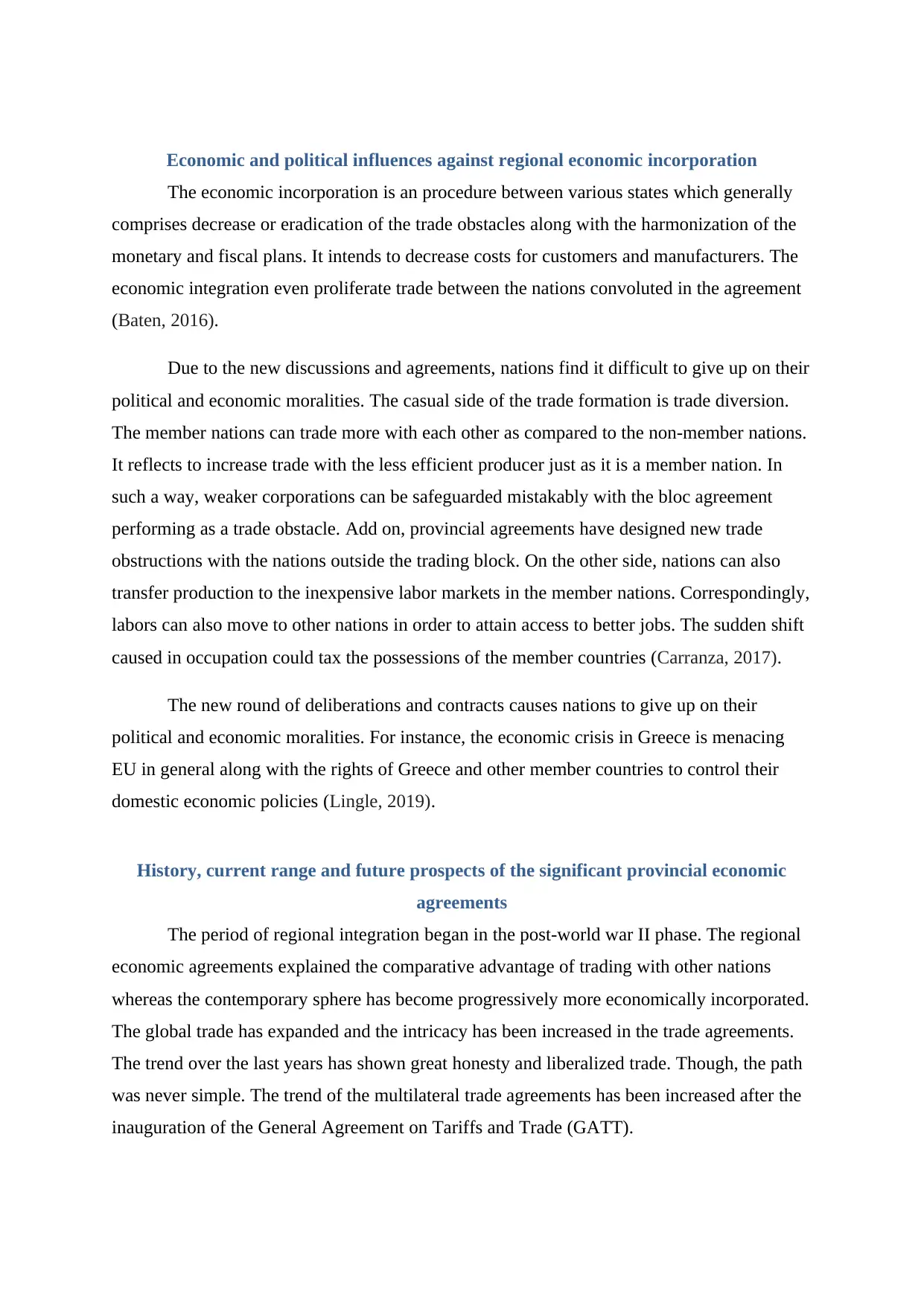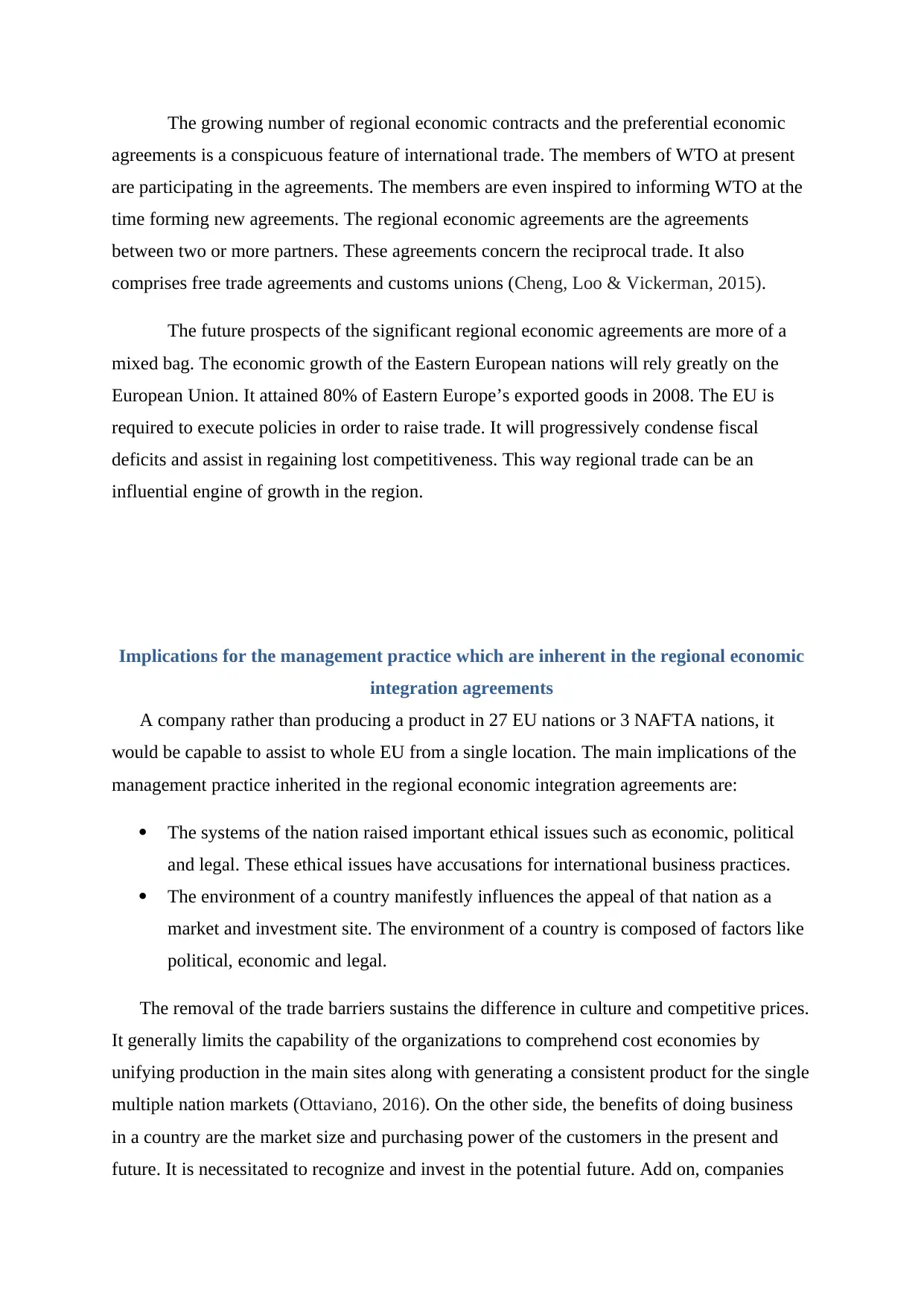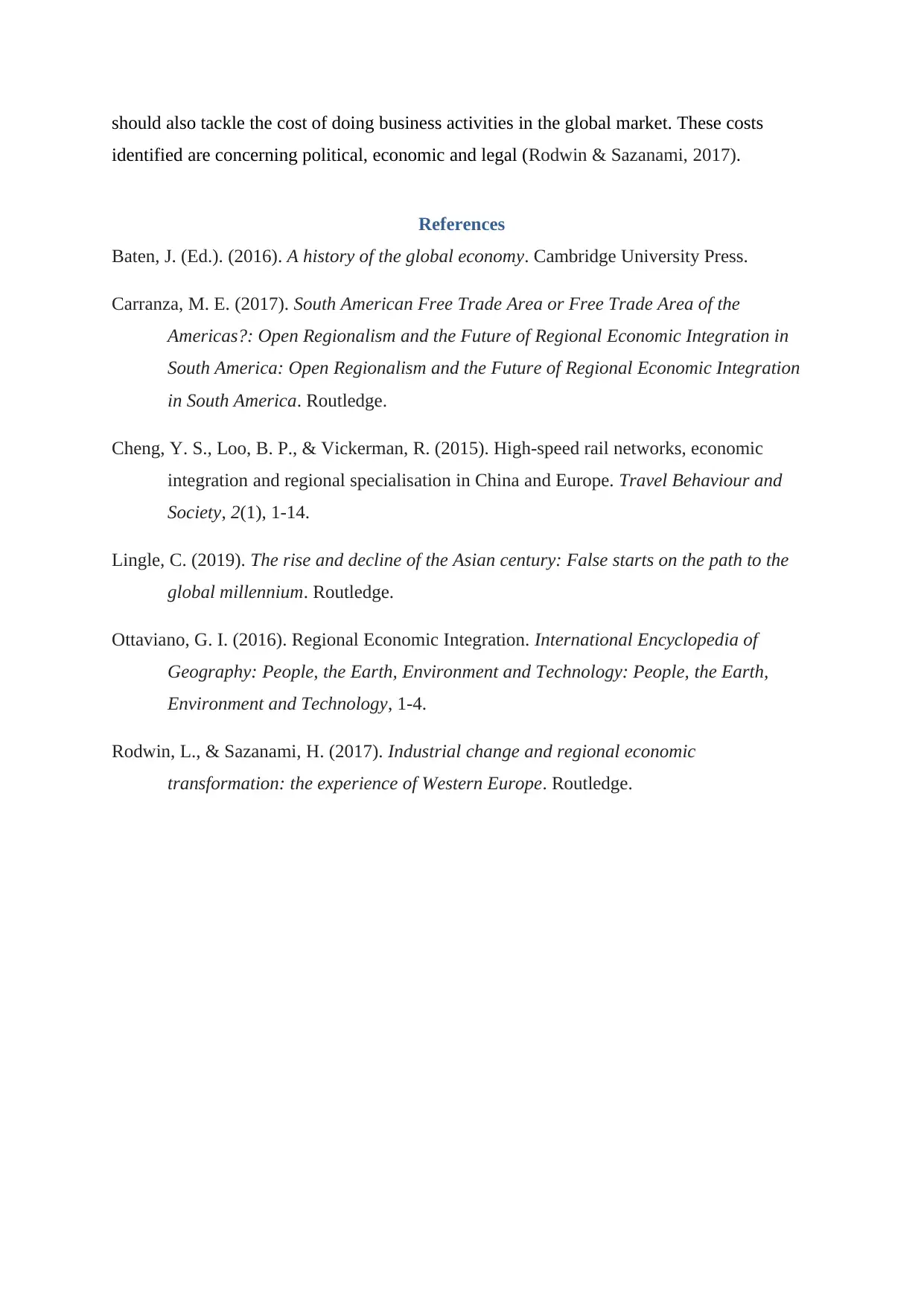Analysis of Regional Economic Integration in Global Business Context
VerifiedAdded on 2023/01/05
|5
|1086
|73
Report
AI Summary
This report provides a comprehensive analysis of regional economic integration, addressing economic and political arguments against it, the historical context, current scope, and future prospects of major regional economic agreements. It explores the implications of these agreements on management practices, including ethical issues, market dynamics, and the impact on business operations. The report examines the evolution of regional integration post-World War II, the role of the WTO, and the significance of trade agreements. It also discusses the challenges faced by businesses in navigating the complexities of global markets and the importance of adapting to cultural differences and competitive pricing. The report concludes by highlighting the significance of understanding market size, purchasing power, and the costs associated with global business activities.

Global business in the Asian century
Paraphrase This Document
Need a fresh take? Get an instant paraphrase of this document with our AI Paraphraser

Contents
Economic and political arguments against regional economic integration............................................2
History, current scope and future prospects of the significant regional economic agreements..............2
Implications for the management practice which are inherent in the regional economic integration
agreements.............................................................................................................................................3
References.............................................................................................................................................4
Economic and political arguments against regional economic integration............................................2
History, current scope and future prospects of the significant regional economic agreements..............2
Implications for the management practice which are inherent in the regional economic integration
agreements.............................................................................................................................................3
References.............................................................................................................................................4

Economic and political influences against regional economic incorporation
The economic incorporation is an procedure between various states which generally
comprises decrease or eradication of the trade obstacles along with the harmonization of the
monetary and fiscal plans. It intends to decrease costs for customers and manufacturers. The
economic integration even proliferate trade between the nations convoluted in the agreement
(Baten, 2016).
Due to the new discussions and agreements, nations find it difficult to give up on their
political and economic moralities. The casual side of the trade formation is trade diversion.
The member nations can trade more with each other as compared to the non-member nations.
It reflects to increase trade with the less efficient producer just as it is a member nation. In
such a way, weaker corporations can be safeguarded mistakably with the bloc agreement
performing as a trade obstacle. Add on, provincial agreements have designed new trade
obstructions with the nations outside the trading block. On the other side, nations can also
transfer production to the inexpensive labor markets in the member nations. Correspondingly,
labors can also move to other nations in order to attain access to better jobs. The sudden shift
caused in occupation could tax the possessions of the member countries (Carranza, 2017).
The new round of deliberations and contracts causes nations to give up on their
political and economic moralities. For instance, the economic crisis in Greece is menacing
EU in general along with the rights of Greece and other member countries to control their
domestic economic policies (Lingle, 2019).
History, current range and future prospects of the significant provincial economic
agreements
The period of regional integration began in the post-world war II phase. The regional
economic agreements explained the comparative advantage of trading with other nations
whereas the contemporary sphere has become progressively more economically incorporated.
The global trade has expanded and the intricacy has been increased in the trade agreements.
The trend over the last years has shown great honesty and liberalized trade. Though, the path
was never simple. The trend of the multilateral trade agreements has been increased after the
inauguration of the General Agreement on Tariffs and Trade (GATT).
The economic incorporation is an procedure between various states which generally
comprises decrease or eradication of the trade obstacles along with the harmonization of the
monetary and fiscal plans. It intends to decrease costs for customers and manufacturers. The
economic integration even proliferate trade between the nations convoluted in the agreement
(Baten, 2016).
Due to the new discussions and agreements, nations find it difficult to give up on their
political and economic moralities. The casual side of the trade formation is trade diversion.
The member nations can trade more with each other as compared to the non-member nations.
It reflects to increase trade with the less efficient producer just as it is a member nation. In
such a way, weaker corporations can be safeguarded mistakably with the bloc agreement
performing as a trade obstacle. Add on, provincial agreements have designed new trade
obstructions with the nations outside the trading block. On the other side, nations can also
transfer production to the inexpensive labor markets in the member nations. Correspondingly,
labors can also move to other nations in order to attain access to better jobs. The sudden shift
caused in occupation could tax the possessions of the member countries (Carranza, 2017).
The new round of deliberations and contracts causes nations to give up on their
political and economic moralities. For instance, the economic crisis in Greece is menacing
EU in general along with the rights of Greece and other member countries to control their
domestic economic policies (Lingle, 2019).
History, current range and future prospects of the significant provincial economic
agreements
The period of regional integration began in the post-world war II phase. The regional
economic agreements explained the comparative advantage of trading with other nations
whereas the contemporary sphere has become progressively more economically incorporated.
The global trade has expanded and the intricacy has been increased in the trade agreements.
The trend over the last years has shown great honesty and liberalized trade. Though, the path
was never simple. The trend of the multilateral trade agreements has been increased after the
inauguration of the General Agreement on Tariffs and Trade (GATT).
⊘ This is a preview!⊘
Do you want full access?
Subscribe today to unlock all pages.

Trusted by 1+ million students worldwide

The growing number of regional economic contracts and the preferential economic
agreements is a conspicuous feature of international trade. The members of WTO at present
are participating in the agreements. The members are even inspired to informing WTO at the
time forming new agreements. The regional economic agreements are the agreements
between two or more partners. These agreements concern the reciprocal trade. It also
comprises free trade agreements and customs unions (Cheng, Loo & Vickerman, 2015).
The future prospects of the significant regional economic agreements are more of a
mixed bag. The economic growth of the Eastern European nations will rely greatly on the
European Union. It attained 80% of Eastern Europe’s exported goods in 2008. The EU is
required to execute policies in order to raise trade. It will progressively condense fiscal
deficits and assist in regaining lost competitiveness. This way regional trade can be an
influential engine of growth in the region.
Implications for the management practice which are inherent in the regional economic
integration agreements
A company rather than producing a product in 27 EU nations or 3 NAFTA nations, it
would be capable to assist to whole EU from a single location. The main implications of the
management practice inherited in the regional economic integration agreements are:
The systems of the nation raised important ethical issues such as economic, political
and legal. These ethical issues have accusations for international business practices.
The environment of a country manifestly influences the appeal of that nation as a
market and investment site. The environment of a country is composed of factors like
political, economic and legal.
The removal of the trade barriers sustains the difference in culture and competitive prices.
It generally limits the capability of the organizations to comprehend cost economies by
unifying production in the main sites along with generating a consistent product for the single
multiple nation markets (Ottaviano, 2016). On the other side, the benefits of doing business
in a country are the market size and purchasing power of the customers in the present and
future. It is necessitated to recognize and invest in the potential future. Add on, companies
agreements is a conspicuous feature of international trade. The members of WTO at present
are participating in the agreements. The members are even inspired to informing WTO at the
time forming new agreements. The regional economic agreements are the agreements
between two or more partners. These agreements concern the reciprocal trade. It also
comprises free trade agreements and customs unions (Cheng, Loo & Vickerman, 2015).
The future prospects of the significant regional economic agreements are more of a
mixed bag. The economic growth of the Eastern European nations will rely greatly on the
European Union. It attained 80% of Eastern Europe’s exported goods in 2008. The EU is
required to execute policies in order to raise trade. It will progressively condense fiscal
deficits and assist in regaining lost competitiveness. This way regional trade can be an
influential engine of growth in the region.
Implications for the management practice which are inherent in the regional economic
integration agreements
A company rather than producing a product in 27 EU nations or 3 NAFTA nations, it
would be capable to assist to whole EU from a single location. The main implications of the
management practice inherited in the regional economic integration agreements are:
The systems of the nation raised important ethical issues such as economic, political
and legal. These ethical issues have accusations for international business practices.
The environment of a country manifestly influences the appeal of that nation as a
market and investment site. The environment of a country is composed of factors like
political, economic and legal.
The removal of the trade barriers sustains the difference in culture and competitive prices.
It generally limits the capability of the organizations to comprehend cost economies by
unifying production in the main sites along with generating a consistent product for the single
multiple nation markets (Ottaviano, 2016). On the other side, the benefits of doing business
in a country are the market size and purchasing power of the customers in the present and
future. It is necessitated to recognize and invest in the potential future. Add on, companies
Paraphrase This Document
Need a fresh take? Get an instant paraphrase of this document with our AI Paraphraser

should also tackle the cost of doing business activities in the global market. These costs
identified are concerning political, economic and legal (Rodwin & Sazanami, 2017).
References
Baten, J. (Ed.). (2016). A history of the global economy. Cambridge University Press.
Carranza, M. E. (2017). South American Free Trade Area or Free Trade Area of the
Americas?: Open Regionalism and the Future of Regional Economic Integration in
South America: Open Regionalism and the Future of Regional Economic Integration
in South America. Routledge.
Cheng, Y. S., Loo, B. P., & Vickerman, R. (2015). High-speed rail networks, economic
integration and regional specialisation in China and Europe. Travel Behaviour and
Society, 2(1), 1-14.
Lingle, C. (2019). The rise and decline of the Asian century: False starts on the path to the
global millennium. Routledge.
Ottaviano, G. I. (2016). Regional Economic Integration. International Encyclopedia of
Geography: People, the Earth, Environment and Technology: People, the Earth,
Environment and Technology, 1-4.
Rodwin, L., & Sazanami, H. (2017). Industrial change and regional economic
transformation: the experience of Western Europe. Routledge.
identified are concerning political, economic and legal (Rodwin & Sazanami, 2017).
References
Baten, J. (Ed.). (2016). A history of the global economy. Cambridge University Press.
Carranza, M. E. (2017). South American Free Trade Area or Free Trade Area of the
Americas?: Open Regionalism and the Future of Regional Economic Integration in
South America: Open Regionalism and the Future of Regional Economic Integration
in South America. Routledge.
Cheng, Y. S., Loo, B. P., & Vickerman, R. (2015). High-speed rail networks, economic
integration and regional specialisation in China and Europe. Travel Behaviour and
Society, 2(1), 1-14.
Lingle, C. (2019). The rise and decline of the Asian century: False starts on the path to the
global millennium. Routledge.
Ottaviano, G. I. (2016). Regional Economic Integration. International Encyclopedia of
Geography: People, the Earth, Environment and Technology: People, the Earth,
Environment and Technology, 1-4.
Rodwin, L., & Sazanami, H. (2017). Industrial change and regional economic
transformation: the experience of Western Europe. Routledge.
1 out of 5
Related Documents
Your All-in-One AI-Powered Toolkit for Academic Success.
+13062052269
info@desklib.com
Available 24*7 on WhatsApp / Email
![[object Object]](/_next/static/media/star-bottom.7253800d.svg)
Unlock your academic potential
Copyright © 2020–2026 A2Z Services. All Rights Reserved. Developed and managed by ZUCOL.




